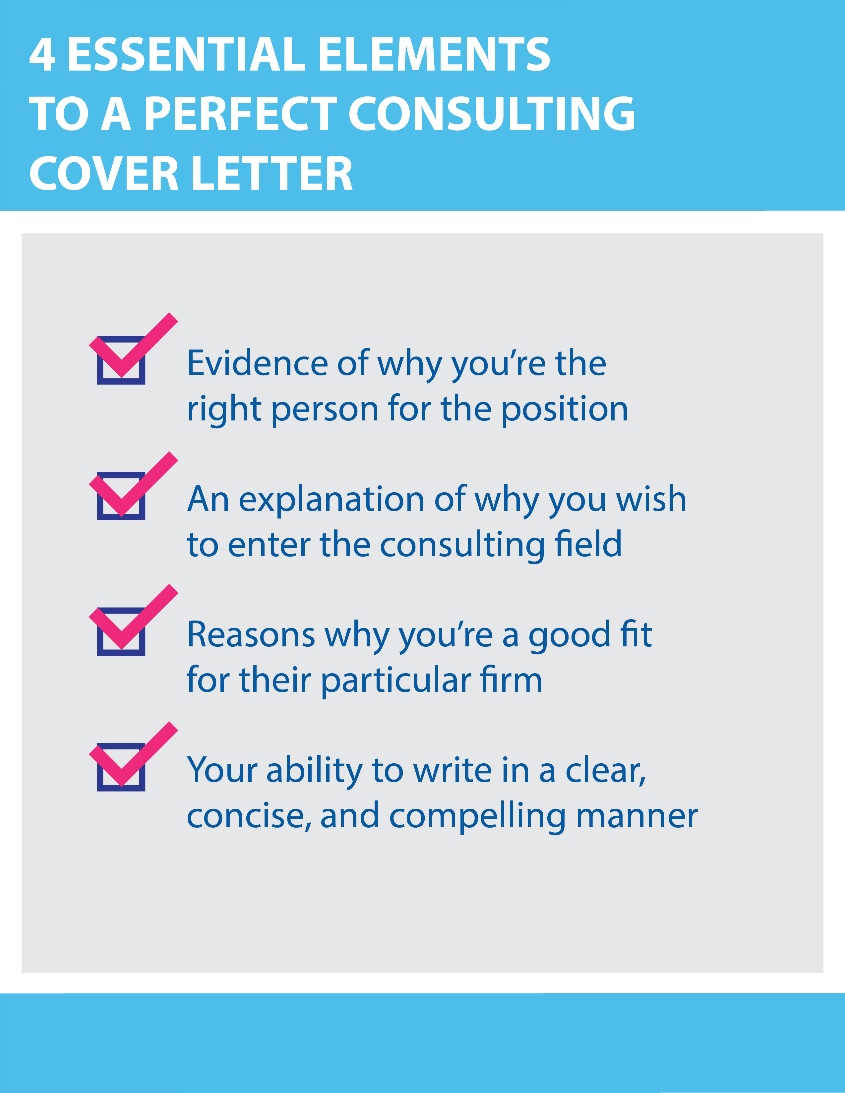FREE Resume Tips Email and Video Series
This form collects your name and email so that we can add you to our email list that delivers the free resources you are requesting. Check out our privacy policy for details on how we protect and manage your submitted data.
We’ll never spam you or share your email. Unsubscribe at any time.
Your cover letter can make a big difference when applying for a management consulting position. Because the cover letter is typically read before your resume, it plays an essential chronological role during the application process.
Consulting firms will typically read your cover letter to quickly identify what makes you different from thousands of other applicants. Therefore, writing a strong and unique cover letter can make you stand out from the competition and ensure that your achievements aren’t overlooked.
A strong cover letter presents an excellent opportunity for you to demonstrate why you’re the best candidate for the job, and to plead your case as to why the firm should hire you over other applicants.
This guide will cover 11 essential steps towards writing the perfect consulting cover letter.
Tip 1 — Know What Consulting Firms Are Looking For
The top consulting firms receive hundreds of thousands of applications each year. For example, McKinsey receives approximately 200,000 applications annually, of which only 2,000 applicants receive an offer. Consulting firms are faced with the arduous task of narrowing down the candidate pool to include only the best.
Interviewing candidates is not a cheap process. The firm wants to ensure that any candidate they interview is qualified for the position, is prepared for management consulting as a career, and is a good fit for the firm.
Therefore, top consulting firms look for four essential elements in a cover letter.
- Evidence of why you’re the right person for the position
- An explanation of why you wish to enter the consulting field
- Reasons why you’re a good fit for their particular firm
- Your ability to write in a clear, concise, and compelling manner

When reading cover letters, screeners will often ask,“Did the applicant spend enough time preparing a strong letter? Have they done their homework regarding the firm and the position in question? Do they have adequate writing skills to prepare compelling emails, reports, and presentations?“
A cover letter is a challenging document to prepare. You may feel worn out after spending hours on your resume, only to realize that you also need to spend as much time (if not more) on your cover letter.
Rather than looking at your consulting cover letter as an annoying extra step, think of it as an excellent opportunity to emphasize your skills and experiences and to set yourself apart from other applicants.
Tip 2 — Make Sure the Letter Has TheseFiveDistinct Sections
While your cover letter doesn’t need to take a formulaic approach, there are five distinct sections that should be covered. They are:
- An Introduction
The introduction should contain which position you’re applying for, your name, address, and contact information. It should also be short, sweet, and entertaining. Write it in such a way that the screener will want to keep reading into the second paragraph.
- Why You’re a Great Candidate
This is the section where you should blow your own horn. Each sentence should speak to your skills, education, and experiences — tying everything back to why you’re a great candidate. Ideally, this section should include your top three achievements to date (relevant to consulting, of course).
- Why Consulting is the Right Fit for You
Remember that the top priority of most consulting firms is to find out whether you’ll become a great consultant if hired. Even with memorable and unique qualifications, a recruiter may not be convinced that these skills will make you a good management consultant. To leave no doubt in their mind, dedicate a section towards explaining why you’re the right person for the job. You can use previous experiences (such as internships, jobs, or academic courses) to tie your career goals to the position in question.
- Why You’re Applying for the Position
The next section should cover why you chose to apply for this exact position in this firm. When laying out your case, identify unique reasons as to why you think McKinsey, Bain, BCG, Deloitte, or any other firm is your firm of choice. To make a compelling argument, identify specific people, reports, or projects that make your story believable. Don’t hesitate to mention specific employees or projects that caught your eye and sparked your interest.
- A Solid Conclusion
Finalize the letter by restating why you believe you’re a great candidate and how you can be of value to the company.
Tip 3 — LinkYour Cover Letter to Your Resume

A consulting cover letter is essentially an opportunity for you to expound on the information you wrote in your resume. What does this mean? It means that your cover letter should highlight the unique achievements, skills, and experiences (relevant to the position) that make you stand out from other applicants.
Your resume and cover letter should work hand in hand to strengthen your application further and demonstrate what makes you stand out.
Start off by identifying what you want the consulting firm to know about you. Draw attention to your career achievements. Maybe you started a business and sold it for a significant profit, or you worked overseas for a few years and have a diverse skillset.
Make sure that unique experiences are mentioned in the first few paragraphs of your cover letter to pique the interest of the resume screener.
Many resume screeners don’t actually read your entire resume.They simply scan it to identify specific items that make you stand out. Because resume screeners scan through hundreds of resumes at a time, they can easily overlook your unique achievements.
The cover letter is your opportunity to prevent this from happening. When you go into detail about achievements in your cover letter, you essentially draw the attention of screeners (and thus give yourself a better chance to land an interview).
Tip 4 — Don’t Forget About Your Resume
Even after referencing the unique skills you have in your cover letter, you need a strong consulting resume to back up your claims. A consulting resume is different from other standard template resumes, as it needs to emphasize a combination of skills that can make you successful as a consultant.
Here are resources that can help you prepare a strong consulting resume. A quality consulting resume will take just as much attention to detail as writing a strong cover letter will. In a nutshell, writing a consulting resume requires you to reflect on your past experiences, select the ones that are most relevant to consulting, and summarize them in a manner that resume screeners can easily scan and digest.
Top consulting firms typically look for the following in your resume:
- Big brand names (employers and schools)
- Strong academic performance (high GPA)
- Strong analytical skills (demonstrated in high standardized test scores)
- Strong leadership and communication skills
- Achievements versus career years (the longer your career is, the more achievements that screeners expect to see)

Also, refer to this resource to identify the top five mistakes that applicants make when writing a consulting resume.
Tip 5 — Avoid Using a Standard Template for Your Cover Letter
It’s no secret that it can be a pain to write a strong cover letter. It takes a lot of time and reflection. You’ll have to revise and edit the piece multiple times before submitting it. But, to truly stand out from other applicants, your letter needs to be interesting, personal, and unique.
The biggest mistake you can make is to copy a standard cover letter template and simply plug in your name and skillset. Screeners hate standard form letters because they’re boring to read, and they show that you’re unwilling to put in the necessary time and effort to write something unique. Because recruiters read thousands of cover letters, they can easily tell when a cover letter is written from a template.
When writing your consulting cover letter, make sure that every sentence is unique. While you may draw inspiration from various templates, add your personal twist to each word and modify it in a manner that emphasizes your unique skillset. For example, instead of starting with the usual format:
“Dear Sir/Madam, I write to apply for a consulting position….”
You can make things more interesting by starting off with what makes you different. Here’s an example:
“After attending Harvard for both my undergraduate and MBA education, I am confident in my ability to become successful as a [insert job position here] at McKinsey.”
Another example:
“My experiences overseas as a Peace Corps volunteer put me in a position to be successful as a [insert job position here] at BCG.”
The idea is to make every sentence in your cover letter count. Add a personal twist to all ofyour skills and experiences and tie them to the job responsibilities of the open position.
Tip 6 — Highlight Your Skills and Experiences via Evidence-Based Storytelling
In your cover letter, the goal should be to tell your story. Rather than simply listing your skills and abilities, demonstrate how various experiences have molded you into the perfect candidate for the position in question. Strive to show that you have what it takes, instead of telling.
For instance, instead of simply stating that you can lead, give a specific example of an experience where you showed leadership qualities. This evidence-based approach shows recruiters that your prior experiences have equipped you with the necessary skills to be successful.
Telling a story makes your cover letter much easier to read. It also makes you stand out from thousands of other applicants who may simply state “I’m a leader,” or, “I’m a hard worker.”
As you use this evidence-based approach, tailor every experience you mention to a specific skillset that is required for the job. If the position requires a candidate with strong interpersonal skills, explain a time when you worked within a team to achieve tangible results. Also, list out any challenges and how you overcame them.
It’s not simply about telling a story. Rather, it’s about telling a story that highlights why you’re a good fit for the job, as well as what makes you stand out from the competition.
Tip 7 — Show Your Value
A common mistake that many applicants make is to only think about personal achievements when applying for consulting positions. Recruiters often read through cover letters that have lots of “me meme” in them.
This is to say that many applicants focus on how they can benefit personally from the position in question, instead of demonstrating how they can become valuable employees (and eventually partners).
Many cover letters talk only about how the candidate will be able to elevate his/her career, experiences, and skills. Such letters only focus on personal goals instead of demonstrating how you can help the company become better. Remember that screeners are looking for candidates who will be of benefit to the firm, not those who are simply using this as an opportunity to enrich themselves and their careers.
When writing your cover letter, emphasize how your skillset will be of benefit to the company. To do this successfully, you need to do your research with regards to what the short-term and long-term goals of the firm are. You can then use these goals and relate them to your unique abilities and experiences.
Tip 8 — One Page Is the Perfect Length
It can be tempting to write a long cover letter, especially if you have a diverse skillset that you feel should be highlighted. However, being concise and keeping it relevant to the position is a much better strategy.
Aim to select only the most relevant experiences that apply directly to the position you’re seeking. You can typically fit these experiences in only one page.
Being concise also makes it easier for recruiters to read through your cover letter quickly without overlooking anything. Edit it down to a concise letter by re-reading and adjusting your original cover letter. The more you read it, the more unnecessary words and content you will find to take out.
Start early so that you can give yourself plenty of time to adjust your cover letter accordingly.
Tip 9 — Be Specific About the Position You’re Applying To
While this may sound obvious, many applicants tend to go off on a tangent about their skills and abilities without first mentioning the job they’re applying for. You should always state the position and office of the job you intend to apply for within the first sentence.
Remember that this information can still be included as you emphasize what makes you different. Here’s an example of an opening sentence that was used earlier in this guide:
“My experiences overseas as a Peace Corps volunteer put me in a position to be successful as a [insert job position here] at BCG.”
Being specific and concise about the job you’re applying for will make it easier for screeners to quickly recognize which position you are interested in.
Tip 10 — Give Yourself Time to Write a Quality Letter
Similar to consulting resumes, writing a strong consulting cover letter takes time. To be successful, you need to consider everything you’ve accomplished as well as what makes you different from everyone else. Don’t think that you can write a strong cover letter in one night. It requires multiple iterations, careful re-reading, and timely feedback.
You also need to make sure that the cover letter blends seamlessly with your resume, and it expounds on the outstanding skills and experiences contained in the resume itself.
Tip 11 — Proofread Thoroughly

And finally, make sure you eliminate any grammatical or spelling mistakes from the final cover letter. These mistakes make you appear careless and can result in being disqualified in the screening process. Don’t let something so simple be your downfall.
Take time to proofread. Ask peers and fellow professionals review your cover letter and give you feedback as well.
Example
Here is an example cover letter that highlights the tips I’ve mentioned. Reference this example as you write your cover letter to make sure that you hit all of the important sections. These items do not necessarily need to appear in the order I have them listed. But, make sure that they are all represented in your cover letter. Below is an example consulting cover letter.
You can also download the example by clicking here.

More Resources:
Free Case Interview Prep Program – Sign Up For Free Instant Access to the Largest Collection of FREE Case Interview Training Resources.
We’ll never spam you or share your email. Unsubscribe at any time.




219 thoughts on “Consulting Cover Letter Tips (and Template)”
Hi Victor,
Off the top, I thank you for opening the doorway for MBB aspirants like me, into the expected standard and the required effort to make it. This is an invaluable service to us all, so I hope you know we are indebted to you.
I am a Bachelor of Engineering (Honors) graduate with First Class Honors in Australia (GPA of 8.2 out of 9.0). Subsequently, I have worked 2 years in EY’s MC practice across a variety of operations and customer-focused areas. My projects have included several Top 50 companies which have strong brands in Australia. In addition, I have provided independent consulting to an e-commerce start-up on their supply chain and logistics.
I am motivated to take the next step work and work alongside the best management consultants at the MBB firms. I was knocked back at undergraduate level without an interview. Thereafter, I have started creating relationships with a handful of MBB consultants, in the attempt to work my way in via networking.
I acknowledge my lack of strategy consulting experience, and limited breadth in work experience. But I have built strong relationships with clients on the back of my consulting work, robust data analytics skills, a real passion for corporate strategy.
Victor, how would you suggest I present myself, so that is stands out from other applicants?
Many thanks in advance.
Regards,
Tim
Hi Victor
Really practical information. I have an engineering background. Completed my MBA with an okay GPA of 3.54 from Hult International Business School formerly Arthur D’ Little School of Management.
My GMAT score is just about okay at 760. I have pre MBA experience of 6 years with a construction firm and a fortune 500 firm in assets management. I did get good grades in strategy & project management during MBA. I did prove my analytic & logical skills on job to get things done by suggesting & implementing out of the box ideas. I have two queries:
1. With these credentials which tier of firms shall I apply to?
2. Shall I put examples of out of the box thinking in cover letter?
Thanks
Firstly, great site with priceless advice. The book has also been a fantastic guide into the mind-set and process for interviews.
Though I do have one major concern. It has been 15 years since I left university and I am attempting to make a career change from IT service management into the world of strategic consulting. I am happy with the CV I have put together and I am up for the challenge of the interview process. The issue is getting there as I am not straight out of a top university and I have no formal experience with ‘consultancy’. Regardless I believe consultancy is the most natural career for me and I wish I had taken this path earlier.
Can you provide some advice and tips on how best to approach this path in a cover letter and also provide some views on how firms see people coming into the industry from other areas?
Many thanks in advance
Martin
Martin,
For a lateral hire, it is best if you network to meet someone who works as a consultant in your target firm and have them endorse your application rather than applying online. See my many articles on networking https://www.caseinterview.com/search
The bias you will need to overcome is the perception that technology consultants aren’t strategic and big picture enough. They can think in terms of computer systems, but don’t naturally think about customer segments, competitive differentiation, pricing strategies, and numerous cross functional issues that go beyond technology and the kinds of issues that get discussed at the board level.
You will have to work really hard to convey that you don’t fit into that stereotype. It’s a very strong bias within the strategy firms. The bias is tech consultant come in after the strategy consultants do the “hard” work.
This is of course not true and the argument could be made for the exact opposite, but that’s the perception. Also by hard, I mean analytically and strategically challenging.
Victor
Hi Victor,
Thank you for this article. I got a call from Bain and I know this article helped for sure, because a year before I had applied to Bain but the phone never rang.
I can say I am a year richer, experienec wise, however speaking to people, getting a feel of the company through these conversations, quoting them, etc., definitely works. I realized that after 2-3 months of networking I could actually write my cover letter with ease.
My initial problem was, I wanted to point out (in bold letters , sometimes literally) everything that I have done and said. So I ended up creating a 1 1/2 page long cover letter (which probably bored the resume scanner to death). After I met a few people from Bain, I could sit down and look at all my achievements and segregate them into those that ‘Bain has to know’, ‘would be good if they knew’ and ‘ that’s not getting mentioned’. Then I worked on just re-phrasing them so that there’s a story to it and its interesting (without sounding exaggerated) and at the same time I could point-out why (through quotes from the people I spoke to) would I be a good fit. Took me time (and lots of paper) until I arrived at a cover letter I was satisfied with.
And now I am happy I read this blog before I sent out my cover letter because, after all the case interveiw preperation, I just wasn’t ready for the ‘reject’ pile.. 😀
Leena,
Nice job on all the revisions. It’s an awful lot of work for a mere 400 words, but it’s what it takes to be competitive. It’s not a guarantee of success, but it does maximize your odds of success. Good luck.
Victor
Hi Victor,
Thank you for all your wonderful advice!
I am a recent graduate from a non-target but well recognized Business School (Top 30 nationally ranked Business School according to Bloomberg/Businessweek).
I have had internship experience at UBS as well as at a Big 4 firm within their Advisory service line.
I am currently employed with the Big 4 firm I interned with and have been fortunate enough to have gained project experience on some high profile Fortune 500 firms in my first year with the firm.
I have always been highly interested in MBB but understood there were barriers from attending a non-target school and graduating with only a mediocre GPA (3.55/4).
Although Big 4 Advisory services are certainly not as high level or well recognized as the MBB or other top tier consulting firms, do you believe my experience (along with networking) would be able to help me land an interview?
Regards,
Jeffrey,
Given your situation, moving to a top firm would be difficult. The natural transition point to “upgrade” employers is at business school. For lateral and experienced hires, most are people who’ve worked in industry as opposed to other consulting firms.
The prevailing interpretation of your application would be if he was that good, we would have got him after his MBA. Fair or not, that’s probably going to be the most common perception.
Nothing is impossible, but I can’t think of any prior precedent of someone of a background similar to yours “upgrading” to a top 3 strategy firm.
Victor
Sorry I forgot to say, thank you for your time
Best Regards
Aysal
Hi Victor,
I’m currently studying at Management Engineering in ITU, which is ranked in the top 250 universities in the field of engineering/technology and ranked 1st in nationwide , with a 3.4 GPA out of 4. Also, I’m working as a risk analysis intern at the Royal Bank of Scotland since Sep,2012. I don’t have any test scores yet but I want to get GMAT in a year before I finish the university. I’m planning to apply consulting firms like McKinsey,BCG,Kearney that located in Turkey. In addition to this, I participated in lots of EU Project, and also I managed 2 social projects in Turkey. My question is What should I do to get the job from McKinsey,BCG,Kearney ? because we don’t have a lot of consulting firms in Turkey, and it is really hard to get in these firms.
Aysal,
To oversimplify and state the obvious, the process is 1) get the interview, 2) pass the interview. The challenge is trying to assess how difficult story #1 will be for you and how much time to devote to it. Step 2 is difficult for everyone and it takes a lot of practice and preparation (I’d budget at least 50 hours and preferably 100 hours for learning and practice). The specifics are covered in my book Case Interview Secres and Look Over My Shoulder.
If getting the interview proves challenging, then networking to compensate for any resume shortfalls can help (though there are limits and networking works best for either borderline applicants or strong applicants with unusual / non-standard backgrounds).
All above topics have articles about them findable at caseinterview.cm/search
Victor
Hi there Victor,
I’m currently working on wrapping up my PhD in neuroscience, and am planning to apply to MBB. Though my degrees are from target schools, and my GPAs fairly strong (over 3.7), I don’t have any standardized test scores. Admissions didn’t require that I write either the SAT or GRE, so I never did. You’ve mentioned on several occasions that the absence of standardized test scores on a resume is conspicuous; should I state that I never took any of these tests in my cover letter? Perhaps include a note on the resume itself? Or do I just say nothing?
Thanks in advance!
–Beth
I suggest writing note on either the cover letter or resume. It just makes the process more efficient and clearer for everyone involved.
Victor
Hi Victor,
I found this article to be extremely informative. I will definitely take a hard and careful look at my cover letter from now on. I’m hoping you can give me some of your wisdom as I’m at a crossroads right now in my career. I’m currently in boutique consulting (pharma/life sciences) and feeling a little bit unchallenged as I’m wondering about what other industries/business problems could be out there. So I’d like to branch out and try my hand at general management consulting.
I started working July of last year after I graduated with my Master’s from University of Pennsylvania. So I’ve only worked in consulting for about 10 months as a Senior Analyst. My biggest concern is that I don’t have the experience to jump ship to the top general consulting firms. In addition, most of my work experiences are R&D internships/co-ops I’ve held in pharma companies (J&J and Pfizer). I’m afraid that with my heavy technical, scientific background (both my bachelor’s and master’s are in the sciences), I will not be able to be screened through. From your POV, would my background even be attractive to McKinsey or any of the top firms? Additionally, is jumping to another consulting firm this early on a bad idea?
Thanks in advance for your insight!
LC
LC,
A strong technical background is usually seen as favorable amongst top consulting firms, provided you have the client skills and interpersonal maturity to work with senior clients.
Analytical Personable = what consulting firms like.
Switching firms now is a tad early, but if your are unchallenged, bored and your job performance is going to suffer, then better to jump now than after your performance or mood deteriorates. Just make sure the next move is what you want, because three employers in 2 years would be yellow flag to the fourth employer.
With your background, you could try applying directly, but I would also recommend networking too. You can see all my articles on networking at https://www.caseinterview.com/search
Hi Victor,
I have been reading your posts and case interview tips, and they are very helpful. I would really appreciate if you could help me with some questions regarding my profile.
I earned a law degree from a Brazilian University in 2005. In addition, I’ve completed a post-graduate Certificate in Business Administration with concentration in Finance and a post-graduate specialization course in Tax Law from two well known schools in Brazil. I worked for 3 years in PwC Brazil as a tax consultant. In 2011, I obtained an LL.M. degree in International Taxation at University of Florida (it is ranked top 3 in international taxation), where I graduated with a GPA of 3.80/4.00 (top 7%). For the last 1.5 years I have been working as an international tax consultant in the NY office of a Big4 audit firm. I am 33 years old and decided that I want to work with strategic consulting and build my career there.
Do you think my age and/or background can be viewed as a problem? Do you have any suggestions that could maximize my chances of being interviewed? Do you think there are any weak spots or issues that I should address in my cover-letter? What do you think my chances are to break into the top3 firms?
Thanks for your time.
Best regards,
Bastos
Bastos,
Your age is not a problem. The background however isn’t typical for top 3 firms. In the US, the university of florida will be seen as a negative (not selective enough) and tax work isn’t seen as highly prestigious or selective incomparison to investment banking.
If your Braziliian educational track record was exceptional, applying to a Brazil office might increase your chances. Your sweet spot will most likely be the top 25 firms, think the strategy groups of the big 4 firms.
The other issue is that tax people tend to get type cast as only able to do tax work. So you want to somehow convey that your perspective is much broader than just tax and ideally convincingly back up this assertion.
Good luck,
Victor